Mastering Natural Herb Extracts for Global Sourcing Professionals A Comprehensive Guide
In today's rapidly evolving global marketplace, the demand for Natural Herb Extracts has surged, driven by a growing consumer awareness of health and wellness. According to a report by Grand View Research, the global herbal extract market is expected to reach USD 10.6 billion by 2025, growing at a CAGR of 7.9%. This shift has prompted sourcing professionals to seek innovative solutions that leverage the unique properties of natural herbs, making it essential for them to master these extracts. As industries such as food and beverages, pharmaceuticals, and cosmetics continuously seek natural alternatives to synthetic ingredients, understanding the complexities of sourcing Natural Herb Extracts can provide a competitive edge. This comprehensive guide aims to equip global sourcing professionals with the knowledge and strategies necessary to navigate this lucrative sector effectively.

Understanding the Basics of Natural Herb Extracts: Types and Benefits
Natural herb extracts have gained significant attention in the global sourcing industry due to their diverse applications and health benefits. Understanding the different types of herb extracts is crucial for sourcing professionals looking to incorporate these natural ingredients into their products. Some common categories include
essential oils,
tinctures, and
powdered extracts, each offering unique properties and uses. Essential oils, for example, are concentrated plant extracts that capture the aromatic compounds, making them popular in
aromatherapy and
natural skincare. Tinctures, on the other hand, are alcohol-based extracts that provide a potent dosage of the herb's medicinal properties, often used for health supplements.
The benefits of natural herb extracts extend beyond their versatility. Many herbs possess
antioxidant,
anti-inflammatory, and
antimicrobial properties, making them valuable in the formulation of wellness products. For instance,
turmeric extract is renowned for its anti-inflammatory effects, while
elderberry extract has gained popularity for its immune-boosting properties. By mastering the basics of natural herb extracts, sourcing professionals can not only enhance their product offerings but also meet the growing consumer demand for natural and effective solutions. This knowledge enables them to make informed decisions, ensuring that the extracts sourced align with both market trends and consumer preferences.
Identifying Reliable Suppliers: Key Factors for Global Sourcing Professionals
In the dynamic arena of global sourcing, identifying reliable suppliers is paramount, particularly in sectors as complex as apparel and aerospace. Recent surveys indicate that brands actively engaging with their supplier base can mitigate risks associated with volatile market conditions. As outlined in a recent apparel CPO survey, five key themes emerged, emphasizing the necessity for targeted actions to foster supplier relationships, promote inclusivity, and uphold human rights within the supply chain. The commitment to sustainability not only enhances a brand's social responsibility but also positions it more competitively in the marketplace.

Furthermore, the integration of artificial intelligence into the supplier identification process is revolutionizing sourcing strategies. New tools enable sourcing professionals to discover potential suppliers in a matter of days, significantly reducing the lead time variability that has long plagued supply chain management. As highlighted in strategic sourcing studies, such advancements can lead to cost reductions and improved supplier negotiation outcomes, reinforcing the importance of embracing technological innovations. By aligning supplier selection with strategic sourcing principles, sourcing professionals can enhance overall supply chain performance while navigating uncertainties inherent in global markets.
Sourcing Strategies: How to Find Quality Natural Herb Extracts Worldwide
In the realm of global sourcing, finding quality natural herb extracts has become increasingly critical. According to a report by Grand View Research, the global herbal supplements market is expected to reach $8.25 billion by 2025, growing at a compound annual growth rate (CAGR) of 7.1%. This surge reflects not only a growing consumer demand for natural products but also the necessity for sourcing professionals to develop effective strategies to ensure quality and authenticity.
To source quality natural herb extracts, professionals should leverage both traditional and digital procurement methods. Engaging with certified suppliers who adhere to Good Manufacturing Practices (GMP) is essential, as highlighted in a study from the American Herbal Products Association, which indicates that 30% of herbal products tested were found to contain ingredients not listed on the label. Furthermore, utilizing platforms like Alibaba or TradeKey can help source lesser-known producers that prioritize product quality over volume, thus fostering deeper relationships and ensuring compliance with international standards. These strategies not only mitigate the risk of counterfeit products but also enhance the credibility of sourcing professionals in a rapidly evolving marketplace.
Quality Control: Ensuring Authenticity and Potency in Herb Extracts
In the realm of natural herb extracts, ensuring quality control is vital for global sourcing professionals. Authenticity and potency are crucial to maintaining the integrity of herbal products. Recent advancements in detection technology have highlighted the importance of chemical markers that can authenticate genuine herbal species and reflect their geographical origins. These markers are essential in differentiating high-quality extracts from adulterated ones, particularly within the booming phytotherapy market.
To ensure rigorous quality control, sourcing professionals should consider adopting robust practices such as systematic fingerprinting. This process aids in the identification of chemical profiles unique to each herbal species, allowing for accurate verification of authenticity. Regular monitoring of these profiles can help mitigate risks associated with adulteration and ensure products meet safety and quality standards.
Tips for maintaining quality control include establishing strong relationships with suppliers who demonstrate transparency in their sourcing methods. Additionally, investing in advanced testing technologies can enhance the ability to authenticate products, ultimately leading to better consumer trust. Regular training for staff on the latest trends in herbal research and authentication methods will also bolster quality assurance efforts, ensuring a reliable supply of potent herb extracts.
Quality Control of Natural Herb Extracts
Navigating Regulations: Compliance in Global Sourcing of Natural Herb Extracts
 Navigating the complex landscape of global sourcing for natural herb extracts requires a deep understanding of regulations that govern their trade. Professionals in this field must become well-versed in the various compliance standards set by international bodies, as well as the specific regulations of individual countries. Each jurisdiction may impose unique requirements on the sourcing, processing, and distribution of these botanical products, from labeling laws to safety assessments. Staying informed about these regulations not only ensures legal compliance but also builds trust with consumers and partners alike.
Navigating the complex landscape of global sourcing for natural herb extracts requires a deep understanding of regulations that govern their trade. Professionals in this field must become well-versed in the various compliance standards set by international bodies, as well as the specific regulations of individual countries. Each jurisdiction may impose unique requirements on the sourcing, processing, and distribution of these botanical products, from labeling laws to safety assessments. Staying informed about these regulations not only ensures legal compliance but also builds trust with consumers and partners alike.
Moreover, global sourcing professionals must implement robust systems for verifying the authenticity and quality of natural herb extracts. This involves rigorous documentation practices and adherence to guidelines established by organizations such as the WHO and the FDA. By fostering relationships with reliable suppliers and conducting thorough due diligence, sourcing experts can mitigate risks associated with product integrity and regulatory violations. Ultimately, a proactive approach to compliance not only safeguards businesses but also contributes to the sustainable and ethical trade of natural herb extracts in an increasingly globalized marketplace.
Related Posts
-

Unlocking the Advantages of Natural Herb Extracts for Global Buyers
-
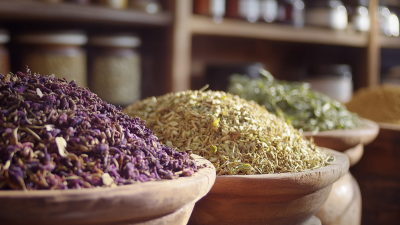
Five Compelling Reasons Global Buyers Choose Natural Herb Extracts for Their Products
-
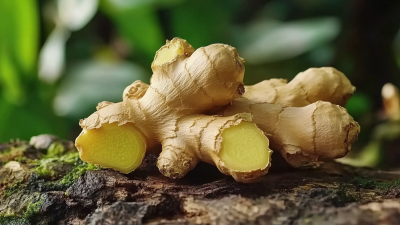
Discover World-Class Quality: China’s Leading Organic Ginger Extract for Global Buyers
-
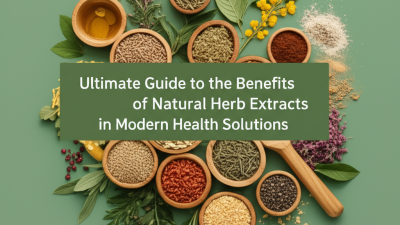
Ultimate Guide to the Benefits of Natural Herb Extracts in Modern Health Solutions
-
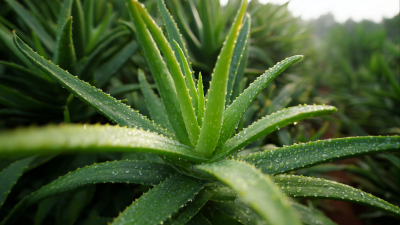
The Ultimate Guide to Sourcing the Best Natural Aloe Vera Leaf: Unlocking Quality and Value for Global Buyers
-
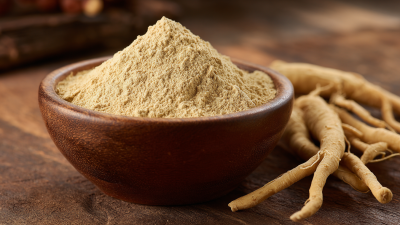
The Ultimate Guide to Sourcing the Best Panax Ginseng Powder for Your Business Needs
